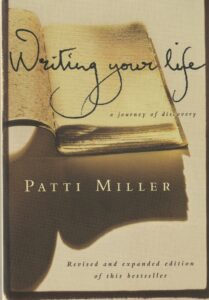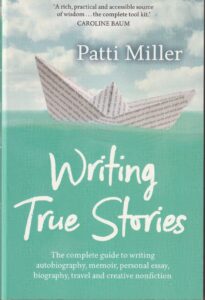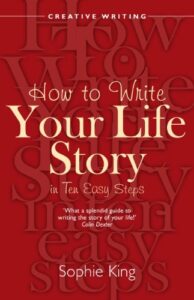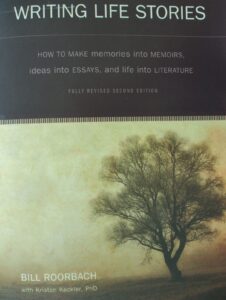Writing a Memoir
 Have you thought about writing up the results of your research and producing a family history. How to do this can be quite a daunting prospect and therefore something which many family historians defer. Not everyone has the time or inclination to write a full family history and many explore other ways of recording the family’s story. Some produce books, others create stories around their photo collections, yet others write blog posts, create websites – the options are endless. One of the aims of GSQs Writing Group is to give members the opportunity to try different forms of writing and also explore the varied processes involved in recording their family history. Each year we develop a program of topics that will hopefully provide inspiration and practical solutions.
Have you thought about writing up the results of your research and producing a family history. How to do this can be quite a daunting prospect and therefore something which many family historians defer. Not everyone has the time or inclination to write a full family history and many explore other ways of recording the family’s story. Some produce books, others create stories around their photo collections, yet others write blog posts, create websites – the options are endless. One of the aims of GSQs Writing Group is to give members the opportunity to try different forms of writing and also explore the varied processes involved in recording their family history. Each year we develop a program of topics that will hopefully provide inspiration and practical solutions.
Our family stories probably start with us, yet often we skip our own and our parents’ generations and focus on finding out as much as we can about our earlier ancestors. Yet, our own story is important: we will be ancestors ourselves one day. Our life experiences are likely to be quite different from those yet to come. For those, like myself, why did we leave our own country and migrate to Australia? Writing our own story gives us an opportunity to decide what legacy we want to leave for our children, grandchildren or the wider family. How do we want to be remembered by family and friends? If we don’t tell our own story, what will others make of the diverse bits and pieces in physical or digital formats that record events and minutiae in our lives. I was recently faced with writing the eulogy for my mother and wondered how I could encapsulate a life of 98 years into a 5-minute address at her funeral. Were my memories of her the ones she would have included; were they the same or different from those of my siblings? I would probably answer ‘maybe’ or ‘possibly’ to both of these questions. These thoughts came into my mind at the April Writing Group meeting when we considered the topic of Writing Memoir. 
The Writing Group hasn’t previously considered this as a stand-alone topic although the idea of writing our own stories has been raised in numerous meetings. It was appropriate, therefore, for us to define what is meant by the term. A memoir is often how one remembers episodes in one’s own life and can therefore be more subjective than a biography written by someone else or an autobiography which aims to cover the whole of a life. A memoir can comprise short pieces, whereas an autobiography is more often historical, telling the story from “cradle to grave”. Memoir and life writing can include journals, letters, meditations on place or people and even travel writing and personal essay. An essential element appears to be a focus on memorable events in a person’s life and the response to those events. Writing a memoir places events within a specific timeframe or context and therefore does not need to be chronological and thus may provide a means to overcome a reluctance to write a full autobiography. Two works by Australian memoir writer and life-writing teacher Patti Miller, Writing True Stories (2017) and Writing Your Life (2001) were invaluable in helping to define what memoir writing is, and is not, and also guidance on how to approach writing your own life.
 As a prelude to the meeting, members were invited to write about an event in their life (250-300 words), focussing particularly on how they reacted to that event. As is often the case, the stories submitted by members covered a broad range of topics and approaches. Some were deeply personal, while others touched more lightly on the event in question. The ensuing discussions were enlightening and it became clear that writing memoir is complex. Focussing on a particular event or period in one’s life, enables a writer to gather together some defining elements of their story that they wish to tell. It can be cathartic to review life-changing events, such as severe illness, migration, love and loss. It can also be life-affirming to celebrate the achievements and successes in our lives. Understanding how we have reacted to events in our lives may help us to understand how our ancestors may have responded if they faced similar challenges or achievements. This could bring them to life in a way that bare facts cannot. However, writing a memoir about an ancestor needs to be placed in time and context which takes me back to my earlier comments regarding finding time and inclination.
As a prelude to the meeting, members were invited to write about an event in their life (250-300 words), focussing particularly on how they reacted to that event. As is often the case, the stories submitted by members covered a broad range of topics and approaches. Some were deeply personal, while others touched more lightly on the event in question. The ensuing discussions were enlightening and it became clear that writing memoir is complex. Focussing on a particular event or period in one’s life, enables a writer to gather together some defining elements of their story that they wish to tell. It can be cathartic to review life-changing events, such as severe illness, migration, love and loss. It can also be life-affirming to celebrate the achievements and successes in our lives. Understanding how we have reacted to events in our lives may help us to understand how our ancestors may have responded if they faced similar challenges or achievements. This could bring them to life in a way that bare facts cannot. However, writing a memoir about an ancestor needs to be placed in time and context which takes me back to my earlier comments regarding finding time and inclination.
Where am I up to in recording my own story? I have transcribed all the diaries and journals that I’ve kept sporadically over the years and the details there have triggered many memories that I can incorporate into a broader narrative. April’s meeting reminded me yet again that I need to continue my own story; parts have already been through several revisions to move it beyond bare facts into something that reflects the legacy I wish to leave. 
Perhaps this blog post will inspire you to start recording your life story in whatever format you prefer. There are numerous books to be found in the non-fiction sections of bookstores and in libraries. GSQs Writing Group has purchased several books which are on the shelves at GSQ – two of these are shown in this post. They can be found by searching the catalogue. Meeting fellow writers, or would-be writers, at Writing Group meetings may just be the inspiration you need.

Hi Pauline, I’ve come to your blog very late but it’s a great read. I’ve heard Patti Miller interviewed and you mentioning her is a good prompt for me to seek out her books. You’ve hit the nail on the head as it were, it’s a lot easier to write about others than ourselves and there are many great reasons (excuses) for doing so. I used to keep diaries when I was growing up and stopped doing it when I had young children, what a pity! But maybe writing one or two short stories about particular events is a good start – I’ll try that.
Thank you for this blog, Pauline. For me, you have clarified the difference between a biography and a memoir. When I redrafted my assignments for the Diploma of Family History (Uni of Tasmania) and produced a PhotobookShop book on my parents and ancestors, it was a combination of their lives and particular events in their lives. I’m not sure what that combination might be called (a bio-memoir?) but the aim was the same – to preserve their memory a bit longer. Like you, I am also in the process of transcribing diaries and calendar notes into a broad collection of moments in my life. Ultimately, it might lead to some stories, as the process triggers memories. I’ll also check the Patti Miller books that you mentioned.
Hi Ross, I’m pleased you found the blog helpful. The Patti Miller books have lots of exercises that can help readers to write stories. Memories of our own lives can often be triggered by seemingly unrelated events, such as hearing a particular song. It’s worth keeping a ‘memories’ book where you can jot down these memories – you don’t necessarily have to write them up into a story. Best wishes for your future writing activities. Pauline